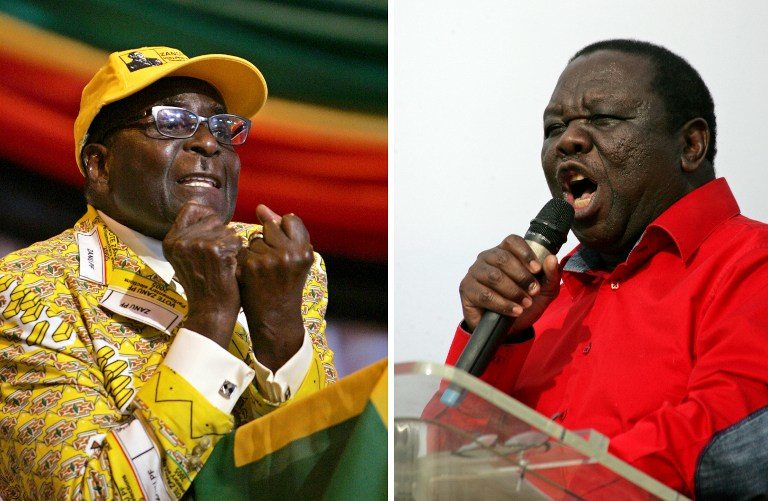SUMMARY
This is AI generated summarization, which may have errors. For context, always refer to the full article.

HARARE, Zimbabwe (UPDATED) – Crisis-weary Zimbabweans were voting Wednesday, July 31, in a fiercely contested election dominated by veteran President Robert Mugabe’s bid to extend his 33-year rule and suspicions of vote rigging.
The 89-year-old firebrand, Africa’s oldest leader, is running for office for the seventh and perhaps final time, after a series of violent crackdowns, economic crises and suspect elections.
But on the eve of the vote, Mugabe vowed to step down if he lost and claimed the army — long the bulwark of his rule — would also respect a victory for Morgan Tsvangirai, his perennial rival and reluctant partner in an uneasy coalition for the past four years.
“If you lose you must surrender,” the 89-year-old said, insisting: “We have done no cheating.”
The United States however, voiced concern about the way the vote would be run and Tsvangirai, who was forced out of the race in 2008 after 200 of his supporters were killed, told CNN he took Mugabe’s promise “with a pinch of salt”.
Voters, some wrapped in blankets on a cold winter morning, started queuing at least four hours before polling stations opened and voting appeared to be brisk in many urban areas, which have traditionally recorded strong support for Tsvangirai.
“I am happy to have cast my vote. I just want an end to the problems in our country,” said 66-year-old Ellen Zhakata as she voted in a Harare township.
“All my children are outside the country because of the economic troubles here. I am so lonely. How I wish they could be working here.”
Millions of Zimbabwean were forced to migrate to find work elsewhere after an economic crisis which was exacerbated by the violence-marred 2008 elections.
While this year’s campaign has seen little of the bloodshed of 2008, Tsvangirai, a 61-year-old former trade union leader, has raised alarm bells about fraud.
His Movement for Democratic Change on Tuesday, July 30, handed what it claimed was documentary evidence of plans to rig the election to observers from the Southern African Development Community (SADC).
The dossier, which an SADC observer said raised serious questions, listed examples of duplicate or questionable voters gleaned from a initial examination of the electoral roll.
In June, the non-governmental Research and Advocacy Unit said after examining an incomplete roll that it included a million dead voters or emigres, as well as over 100,000 people who were more than 100 years old.
“We have seen a lot of duplicate names in the roll, where you see somebody is registered twice, same date of birth, same physical address but with a slight difference in their ID number,” junior minister Jameson Timba told AFP.
At the US State Department, spokeswoman Jen Psaki expressed Washington’s doubts about the way the vote would be run.
“We do remain concerned about the lack of transparency in electoral preparations by continued partisan behavior, by state security institutions, and by the technical and logistical issues hampering the administration of a credible and transparent election,” she said.
The Zimbabwe Electoral Commission was ordered Tuesday to fully publish the roll by 1000 GMT Wednesday, leaving little time to correct problems.
Commission chief Rita Makarau said the delayed access to the roll had affected all parties equally.
“It has not affected one political party, so in a way it remains unfair to all political players,” she said.
Some 6.4 million people, around half of the population, are eligible to vote.
A candidate needs 50 percent of the vote to avoid a run-off and both Mugabe and Tsvangirai appear confident.
Mugabe has focused his campaign on bashing homosexuals and on promises to widen the redistribution of wealth to poor black Zimbabweans.
Amid recovery from an economic crisis that saw mass unemployment and galloping inflation, Mugabe loyalists insist their hero is “tried and tested”.
Credible opinion polls are rare, but according to one survey by the US-based Williams firm in March-April, Mugabe could be in for a rough ride.
In a survey of 800 Zimbabweans, 61 percent said they had a favorable view of the MDC compared with 27 percent for Mugabe’s ZANU-PF.
The poll showed Tsvangirai leading in seven of 10 provinces and that only 34 percent of those who voted for Mugabe in 2008 back him this time around.
Tsvangirai hopes his plans to lure back foreign investors, create a million jobs in five years and improve public services will deliver a long-awaited victory.
Polling stations close at 1700 GMT and final results are expected with five days. – Rappler.com
Add a comment
How does this make you feel?
There are no comments yet. Add your comment to start the conversation.